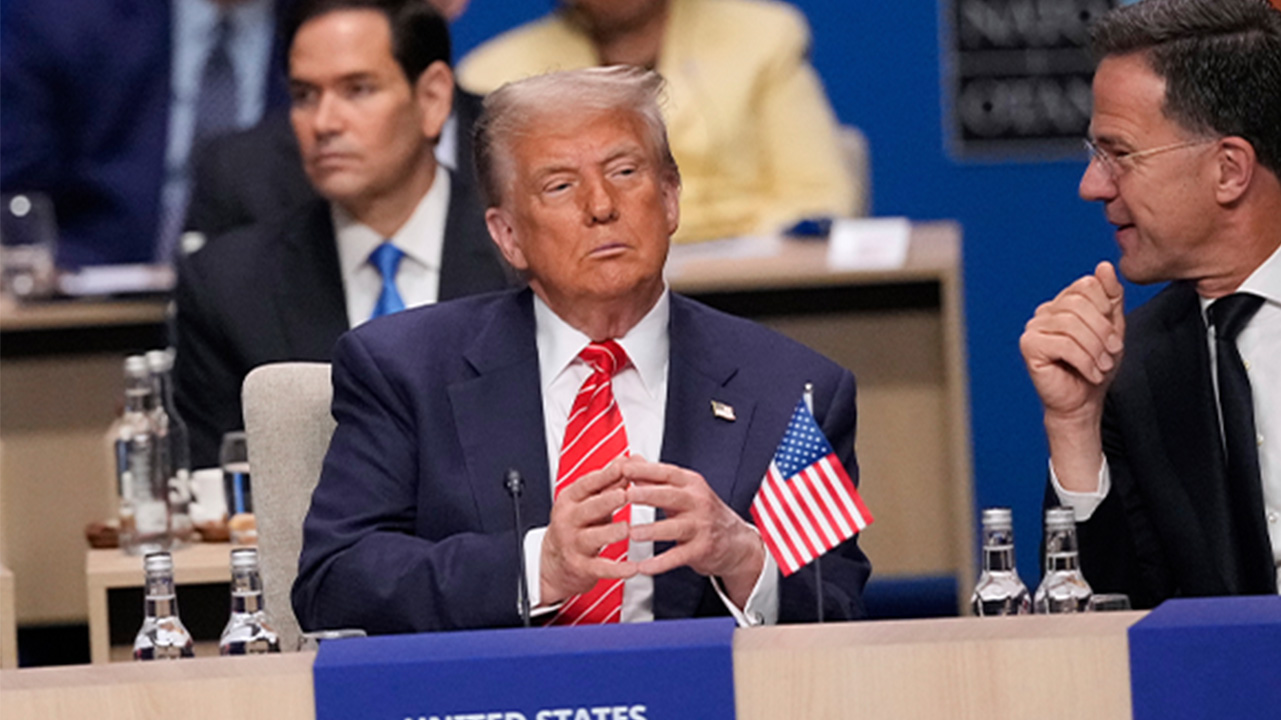Trump escalates pushback on early Pentagon analysis of Iran nuke sites damage
He claimed "fake news" reports on the damage assessment demean the B-2 pilots.
LONDON -- President Donald Trump on Wednesday again claimed "total obliteration" of Iran's nuclear program during the NATO summit in the Netherlands, escalating his pushback on an early Pentagon intelligence report suggesting joint U.S.-Israeli strikes may have set back Iran's nuclear program back by only a matter of months.
"I believe it was total obliteration," Trump told reporters speaking alongside NATO Secretary General Mark Rutte in The Hague, Netherlands.
A preliminary analysis of the strikes by the Defense Intelligence Agency and U.S. Central Command prompted questions as the efficacy of the operation. Two people familiar with the report told ABC News it suggested the strikes did limited damage and that Iran was able to relocate highly enriched uranium stocks before the strikes occurred.

Later on Wednesday, during a solo news conference, Trump continued to push back on that analysis and claimed American pilots who carried out the strikes were being demeaned by news reports about the Pentagon's preliminary assessment.
"Since then, we've collected additional intelligence," he said. "We've also spoken to people who have seen the site, and the site is obliterated, and we think everything nuclear is down there. They didn't take it out."
"They presented something that wasn't finished," Trump said of U.S. intelligence reports on the impact of the U.S. strikes. Over the course of the news conference, Trump highlighted Israeli and Iranian reports of the damage caused by the strike.
Iranian Foreign Ministry spokesperson Esmail Baghaei said Wednesday that the country's nuclear facilities had been "badly damaged," as quoted by the Associated Press -- which Trump repeated.
On Iran, Trump told reporters he's not interested in restarting negotiations and didn't view it as "necessary." Though he also said that the U.S. would be talking with Iran "next week" and "we may sign an agreement. I don't know."
"I don't see them being back involved in the nuclear business anymore," Trump said of Tehran.

Trump earlier Wednesday insisted Iran's nuclear program had been set back "basically decades," adding, "It's gone for years."
"I believe they didn't have a chance to get anything out, because we acted fast," Trump said. "If it would have taken two weeks, maybe. But it's very hard to remove that kind of material, very hard and very dangerous. Plus, they knew we were coming, and if they know we're coming, they're not going to be down there."
Asked if they could rebuild and whether the U.S. would strike again, Trump said that would be someone else's problem.
"I'm not going to have to worry about that," he said. "It's gone for years, years, very tough to rebuild, because the whole thing is collapsed. In other words, inside, it's all collapsed. Nobody can get in to see it, because it's collapsed."
Asked if he trusted U.S. intelligence, the president said the initial report was "very inconclusive. The intelligence says we don't know, it could have been very severe, that's what the intelligence says. So I guess that's correct, but I think we can take the 'we don't know.' It was very severe. It was obliteration."
Defense Secretary Pete Hegseth and Secretary of State Marco Rubio also spoke in support of the president's position, having accompanied Trump to The Hague.
Like Trump, Hegseth (whom the president described as the "secretary of war") claimed what he called "fake news" about the Pentagon assessment as demeaning the B-2 pilots who carried out the strikes.
"These pilots these refuels these fighters, these air defenders, the skill and the courage took to go into enemy territory flying 36 hours on behalf of the American people in the world to take out a nuclear program is beyond what anyone in this audience can fathom," Hegseth said, speaking next to Trump at his news conference.
The defense secretary also rejected the early Pentagon analysis of the damage done by the military operation.
"Given the 30,000 pounds of explosives and capability of those munitions, it was devastation underneath Fordo," Hegseth said.
"Any assessment that tells you it was something otherwise is speculating with other motives," Hegseth continued. "And we know that because when you actually look at the report, by the way, it was a top secret report, it was preliminary, it was low confidence."
Hegseth suggested the leak of the report had "a political motive," adding, "We're doing a leak investigation with the FBI right now because this information is for internal purposes."
Rubio also claimed that the leak of the preliminary report was politically motivated, saying that the attacks led to "complete and total obliteration."
"But all this leaker stuff, these leakers are professional stabbers," he said. "They go out and they read this stuff, and then they tell you what it says against the law, but they characterize it for you in a way that's absolutely false."
The report prompted further consternation among Trump's opponents in Washington. Democratic Sens. Jeanne Shaheen and Chris Coons told ABC News at the NATO summit it is too soon to determine the success of U.S. strikes, adding that the recent round of fighting could have been avoided if Trump had not withdrawn from the Iran nuclear deal in his first term.
"The American public needs answers for what what's really going on," Shaheen, ranking member of the Senate Foreign Relations Committee and senior member of the Senate Armed Services Committee, said. "If what we see is Iran's nuclear program has not been obliterated, then we need to try and get Iran back to the negotiating table," she added.
Shaheen said further nuclear tensions are also possible, as Tehran may "be convinced their race to get a nuclear weapon is even more important -- given North Korea's example -- and they will do everything possible to get there as quickly as possible."
Meanwhile, Trump said the ceasefire is "going very well" despite Tuesday's continued exchanges, which prompted him to lambast both Israel and Iran and to speak with Israeli Prime Minister Benjamin Netanyahu to warn him off further attacks.
"Israel came back yesterday," he said. "I was so proud of them, because they came back, you know, they went out because they felt it was a violation. And technically they were right, but it just wouldn't have worked out very well. And they brought the planes back."
"They're not going to be fighting each other," he added of Israel and Iran. "They've had it. They've had a big fight, like two kids in a schoolyard. You know, they fight like hell. You can't stop them. Let them fight for about two, three minutes. Then it's easier to stop them."
Trump said the U.S. strikes on Iran's nuclear facilities on Saturday proved decisive. "That hit ended the war," he said, likening the U.S. atomic bomb attacks on Japan at the end of World War II.
"I don't want to use an example of Hiroshima, I don't want to use an example of Nagasaki, but that was essentially the same thing that ended that war," Trump said. "If we didn't take that out, they would have been, they'd be fighting right now," he continued.
The president expressed optimism about the future of U.S. and Iranian relations.
"I think we'll end up having somewhat of a relationship with Iran," he said. "I've had a relationship over the last four days. They agreed to the ceasefire, and it was a very equal agreement. They both said, that's enough. They both said it."
ABC News' Joe Simonetti, Luis Martinez, Anne Flaherty and Ivan Pereira contributed to this report.











